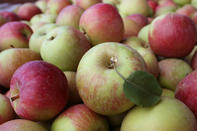The traditional varieties of apples produced in South Africa for local consumption are Golden Delicious, Royal Gala, Braeburn and Granny Smith. However, as South Africa’s apple industry is aimed primarily at the export market, most notably Europe and the United Kingdom, the varieties produced for the export market are selected according to the preference of these markets.

The major varieties produced in South Africa mostly for export are therefore Golden Delicious (24%), Royal Gala/Gala (17%), Granny Smith (15%), Cripp’s Pink and Pink Lady® (11%), Topred/Starking (11%), Fuji (9%), Cripp’s Red, Joya® (5%) and Braeburn (3%).
South African Golden Delicious apples are sought after in the UK. The fruit size of this variety from South Africa is relatively small and these are in demand to include in children’s school lunches. In general, the European market favours apples with a tart flavour. An example of this is that the tart flavour of the bright green Granny Smith apples is much prized in Northern Europe, both for eating fresh as well as for use in baking. Sweeter apples, such as Royal Gala, Fuji, are favoured in South Africa as well as the rest of Africa.
Cripp’s Pink and Pink Lady®, Cripp’s Red, Joya® and Kanzi are relatively new apple varieties. Currently the most rapidly growing new variety is Kanzi which was bred in Belgium. Over the fast five years since 2015 productions of Kanzi have increased from 12 000 cartons to to 250 000 cartons in 2019.
South African Apple Varieties
Due to the climatic requirements for apple production, apples have generally only been grown in areas with cold winters with sufficient cold units conditions for ideal development, particularly good colour development. In response to this challenge Culdevco, the South African company that has the license to market and commercialise new apple cultivars developed by the Infruitec-Nietvoorbij facility of the South African government’s ARC (Agricultural Research Council), has been developing a range of apple varieties that can be grown in warmer conditions.
Cultivars with lower cold requirements, such as Afri Star, Afri Blush, Afri Glo, Afri Coral, Afri Rose and Afri Sunrise, were developed for South African lower chilling conditions. These low-chill varieties are the result of more than 15 years of breeding, selection and evaluation and the breeding programme is aimed to reduce climatic risks and provide emerging and small-scale producers with a means to diversify market risk and increase profits.